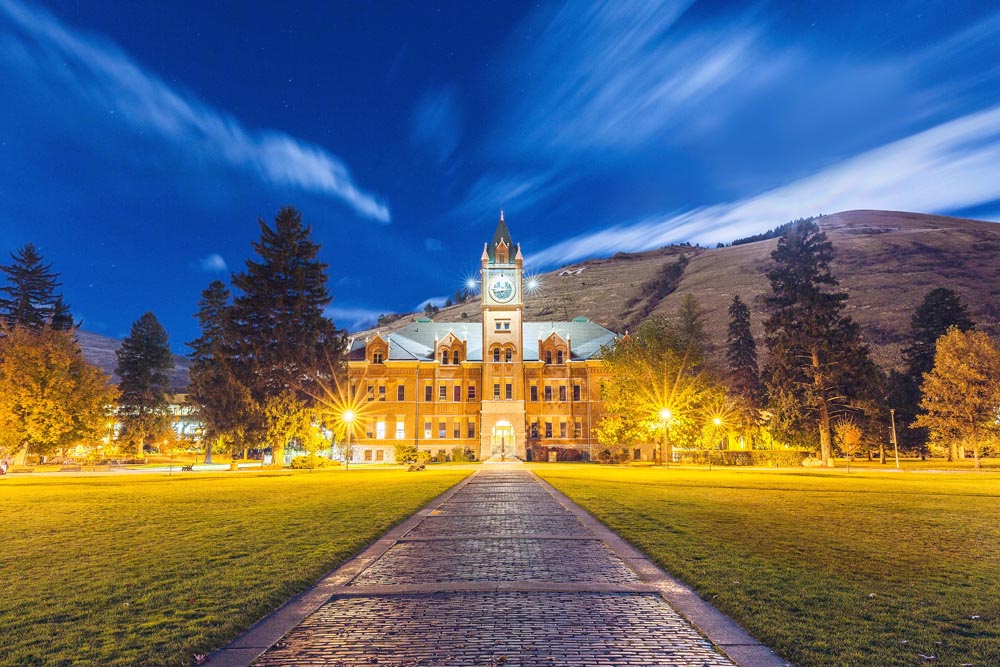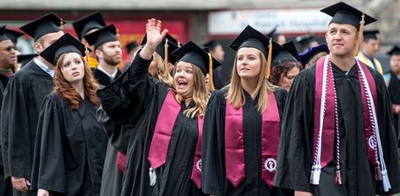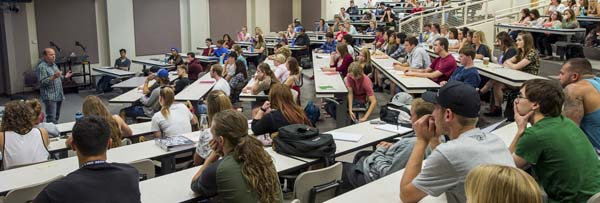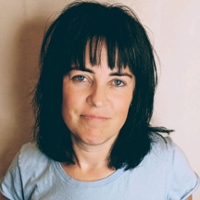- Editorial Offices
- 203 Brantly Hall
- Missoula, MT 59812
- (406) 243-2488
- themontanan@umontana.edu
A Campaign for UM
Historic effort invites supporters to Think Big. Be Bold.
It might seem like the cards were stacked against Mark Boatman, but he never really saw it that way.
He was diagnosed with Duchenne muscular dystrophy when he was 5, a degenerative disease that required him to use a wheelchair. When his condition led him to needing a ventilator to breathe, he landed in a nursing home for three years. And he might have stayed there, in Jamestown, North Dakota, if he hadn’t been determined enough to start an online ventilator support group, which is where he met some friends who encouraged him to move to Missoula and, eventually, enroll at the University of Montana.
“The day he told us he was considering moving to Missoula we were a little bit in shock,” says his mother, Linda Boatman. “He relied on 24-hour care, so we weren’t pleased. But it was Mark’s life, and we didn’t want to get in the way of that.”
Institutionalization is common for people with degenerative diseases like Mark’s, but when he enrolled at UM’s School of Journalism in 2007, he changed the trajectory of his life. With the help of his live-in roommates and the support of the University, Mark’s talent for reporting shone through.
Journalism Professor Dennis Swibold says Mark excelled at writing in his Public Affairs Reporting class, always turning in crisp, clean copy and tackling the two-story-per-week requirement. He wrote about issues linked to the American with Disabilities Act, and he often challenged UM to up its game in regard to access. The University, in turn, supported him with a scholarship and provided him with technological support that furthered his success.
“He did remarkable work,” Swibold says. “It was publishable work, even as a junior. He was precise, and he always had a strong point to make. He found a life here and an independence he couldn’t find anywhere else.”
After graduating in 2012, Mark asked his parents about giving back to UM by establishing a scholarship with their help.
“Getting his degree was an awesome experience for him,” Linda says. “He really felt that journalism had given him a voice, and he wanted to give that to others.”
Together, the three of them started the Boatman Family Scholarship, which would be awarded to a promising journalism student involved in the community. When the scholarship was announced, Mark spoke about why he decided to create the fund.
“Pursuing a degree in journalism while having a severe disability isn’t easy,” he said at the time. “The UM School of Journalism accommodated my needs as a disabled student while pushing me to become a competent professional. This gift is to show my appreciation to the school and to assist journalism students who are working toward professional success.”
Mark passed away in December 2017 at the age of 42, living long past what was predicted for his condition. At his funeral, professors and students spoke about his perseverance and talent, and the legacy he left behind at the J-School. If the cards were stacked against him in the beginning, by the end, he’d come out on top. And the scholarship, which his parents plan to keep funding for as long as they can, was his way of paying forward that access for generations of journalism students to come.
Mari Hall, a 2018 UM graduate working as a reporter for the Missoula Current, was a recipient of the Boatman scholarship in 2017.
“The scholarship means so much to me, and I was honored to receive an award on behalf of Mark and his family,” Hall says. “I remember contacting Mark before he passed while I was working on a research paper about the lack of journalists with disabilities in the newsroom. Though Mark passed before I could speak to him, I know he would have taught me a lot because he was a leader on this topic. I’ll always cherish this award, because it made a difference to me.”
Mark Boatman’s example is just one of many stories about how donors have helped generations of students. In a time when public funding for education has decreased, private funding, like the Boatman scholarship, has become more vital than ever to higher education.
 In October, UM President Seth Bodnar made a historical announcement at the UM Foundation’s annual gathering of the President’s Club, which includes donors who annually contribute $1,000 or more. Bodnar shared his bold vision for UM and issued a call to action that triggered buzz around the Homecoming weekend activities. The University was embarking on its most ambitious fundraising campaign ever – Campaign Montana: Think Big. Be Bold. – with the goal to raise $400 million.
In October, UM President Seth Bodnar made a historical announcement at the UM Foundation’s annual gathering of the President’s Club, which includes donors who annually contribute $1,000 or more. Bodnar shared his bold vision for UM and issued a call to action that triggered buzz around the Homecoming weekend activities. The University was embarking on its most ambitious fundraising campaign ever – Campaign Montana: Think Big. Be Bold. – with the goal to raise $400 million.
“Our collective charge is to ensure that every UM student succeeds,” the president said. “To ensure they persist to complete their degrees. To ensure they are supported and given access to the best possible learning environment. To ensure they are prepared not just for their first jobs – but also for their fifth. To ensure they are ready to lead their communities and this nation as educated, innovative, productive citizens.”
After five years of a quiet phase with $325 million already gifted or pledged by incredibly generous donors, the University was now at a crossroads with important work to do.
“Our aim is to make this University – your University – a national model for how we deliver on our compact to marry accessibility with quality and provide a transformative experience – in and out of the classroom – to help our students realize their own potentials while impacting the communities they live in,” Bodnar said. “This is the defining challenge of our time, and at UM we tackle this challenge with boundless energy. We need your partnership. Your passion and commitment are more critical now than at any time in UM history.”
The unprecedented campaign already has inspired donors who want to support UM’s students, programs, facilities and faculty.
“University alumni and friends are deeply committed to success for students and achievement of the UM mission,” says Cindy Williams, president and CEO of the UM Foundation. “As we see in the campaign’s momentum so far, donors are investing generously in strategic initiatives that create pathways to success.
“President Bodnar and Provost Jon Harbor’s plan for student success is comprehensive – with strategically crafted programs and the activation of professionals, tools and assets to serve students,” she says. “UM supporters are eager to learn how they can help achieve life-changing outcomes for students. Their investment will continue to shape this remarkable transformation.”
The UM Foundation, in its mission to inspire philanthropic support to enhance excellence and opportunity at UM, is an active participant in the president’s call to action for partnership.
“The promise made by the UM Foundation’s board of trustees, the Campaign Montana executive and steering committees, and our 55 professional staff members, is to help connect UM donors with the programs they are passionate about,” Williams says.

The vision for Campaign Montana is bold because the opportunity to dramatically increase student degree completion, foster success in careers and develop engaged global citizens has energized University leaders to resist the status quo. You don’t achieve greatness without leaping. Visit any UM department website and you can find hundreds of fascinating programs and opportunities to enhance the student experience that would benefit from private support. And because UM is not an island, it makes sense that gifts as big as a building renovation and as small as a $1,000 scholarship keep giving. Because when UM students, faculty and staff succeed, these wins echo into the future.
“The founders said an educated citizenry is the bulwark of our republic, so when I think about the success of this institution, in part that success rests on our work providing that educated citizenry,” President Bodnar says. “It’s not just the workforce, which is important. Of course we want our students to be engaged productive citizens who are effective in their jobs. But we also want citizens who can adapt, because the one thing we know about this world is that it changes pretty quickly. How do we build our University so we can help students be the most successfully agile? Not just here, but over the course of their careers?
“That’s what’s at the heart of it – fulfilling our incredibly important mission in the most effective way we can,”
he says. “To do this well – to be a national example of excellent service to students – requires significant resources. As an institution we are investing the resources, but we won’t achieve the level of excellence to which we aspire without significant private support – and I think it’s support that has tremendous impact.”

Story by : Erika Fredrickson
Erika Fredrickson is a freelance journalist based in Missoula. She graduated from UM’s Creative Writing Program in 1999 and earned a master’s degree in environmental studies in 2009.




